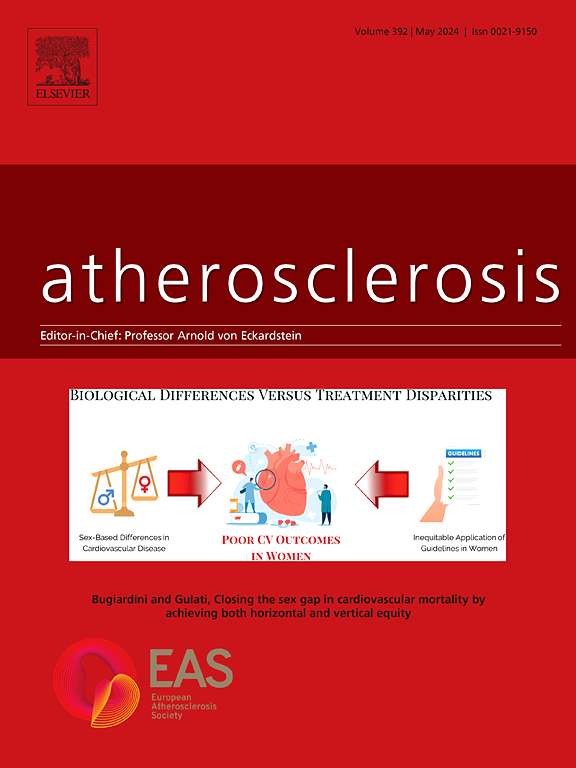降脂疗法对脂蛋白(a)水平的影响:一项随机对照试验的综合meta分析
IF 4.9
2区 医学
Q1 CARDIAC & CARDIOVASCULAR SYSTEMS
引用次数: 0
摘要
背景和目的:脂蛋白(a) [Lp(a)]是动脉粥样硬化性心血管疾病的独立因果危险因素。在这项研究中,我们旨在评估目前可用的降脂疗法(LLTs)对Lp(a)血浆水平的影响。方法按照PRISMA指南进行meta分析。数据库被搜索到2025年5月。纳入标准为:(1)成人(≥18岁)随机对照试验(rct), II期、III期或IV期;(2)英语语言;(3)比较降脂药物与安慰剂的效果(干预组和对照组均可添加相同的药物);(4)报告对Lp(a)水平的影响;(5)干预时间超过3周。分别计算各组间(治疗-安慰剂)Lp(a)绝对平均差值和95%置信区间。结果147项随机对照试验共纳入145314名受试者。他汀类药物、苯甲醚酸、依折替米贝、omega-3脂肪酸和贝特酸盐对Lp(a)浓度没有影响。PCSK9单克隆抗体(pcsk9mab, - 6.37 mg/dL[-7.26至- 5.47],较基线降低29%)、inclisiran (- 4.76 mg/dL[-5.83至- 3.69],较基线降低22%)、CETP抑制剂(CETPi, - 6.77 mg/dL[-8.67至- 4.88],较基线降低46%)和烟酸(- 7.06 mg/dL[-9.27至- 4.85],较基线降低37%)显著降低Lp(a)水平。在基线Lp(a)水平的亚组分析中,观察到随着pcsk9mab、inclisiran和CETPi的基线Lp(a)水平的增加,Lp(a)水平的绝对降低幅度更大。结论在可用的LLTs中,PCSK9mAbs、inclisiran、CETPi和烟酸可显著降低Lp(a)水平。需要进一步的研究来了解这种效应是否会转化为临床相关的心血管益处。本文章由计算机程序翻译,如有差异,请以英文原文为准。

Effect of lipid-lowering therapies on lipoprotein(a) levels: a comprehensive meta-analysis of randomized controlled trials
Background and aims
Lipoprotein (a) [Lp(a)] is an independent and causal risk factor for atherosclerotic cardiovascular disease. In this study we aimed at assessing the effect of currently available lipid-lowering therapies (LLTs) on Lp(a) plasma levels.
Methods
A meta-analysis was performed according to the PRISMA guidelines. Databases were searched up to May 2025. Inclusion criteria were: (1) randomized controlled trials (RCTs) in adults (≥18 years), phase II, III or IV; (2) English language; (3) comparing the effect of lipid-lowering drugs vs placebo (addition of the same drug to both intervention and control group was acceptable); (4) reporting the effects on Lp(a) levels; (5) intervention duration of more than 3 weeks. The between-group (treatment-placebo) Lp(a) absolute mean differences and 95% confidence intervals were calculated for each drug class separately.
Results
A total of 145,314 subjects from 147 RCTs were included. Statins, bempedoic acid, ezetimibe, omega-3 fatty acids, and fibrates did not affect Lp(a) concentration. Lp(a) levels were significantly reduced by PCSK9 monoclonal antibodies (PCSK9mAbs, −6.37 mg/dL [-7.26 to −5.47], a 29% reduction from baseline), inclisiran (−4.76 mg/dL [-5.83 to −3.69], a 22% reduction from baseline), CETP inhibitors (CETPi, −6.77 mg/dL [-8.67 to −4.88], a 46% reduction from baseline), and niacin (−7.06 mg/dL [-9.27 to −4.85], a 37% reduction from baseline). In the subgroup analysis by baseline Lp(a) levels, a larger absolute reduction of Lp(a) levels was observed with increasing baseline levels of Lp(a) for PCSK9mAbs, inclisiran, and CETPi.
Conclusions
Among available LLTs, PCSK9mAbs, inclisiran, CETPi, and niacin significantly decreased Lp(a) levels. Further research is necessary to understand whether this effect would translate into a clinically relevant cardiovascular benefit.
求助全文
通过发布文献求助,成功后即可免费获取论文全文。
去求助
来源期刊

Atherosclerosis
医学-外周血管病
CiteScore
9.80
自引率
3.80%
发文量
1269
审稿时长
36 days
期刊介绍:
Atherosclerosis has an open access mirror journal Atherosclerosis: X, sharing the same aims and scope, editorial team, submission system and rigorous peer review.
Atherosclerosis brings together, from all sources, papers concerned with investigation on atherosclerosis, its risk factors and clinical manifestations. Atherosclerosis covers basic and translational, clinical and population research approaches to arterial and vascular biology and disease, as well as their risk factors including: disturbances of lipid and lipoprotein metabolism, diabetes and hypertension, thrombosis, and inflammation. The Editors are interested in original or review papers dealing with the pathogenesis, environmental, genetic and epigenetic basis, diagnosis or treatment of atherosclerosis and related diseases as well as their risk factors.
 求助内容:
求助内容: 应助结果提醒方式:
应助结果提醒方式:


